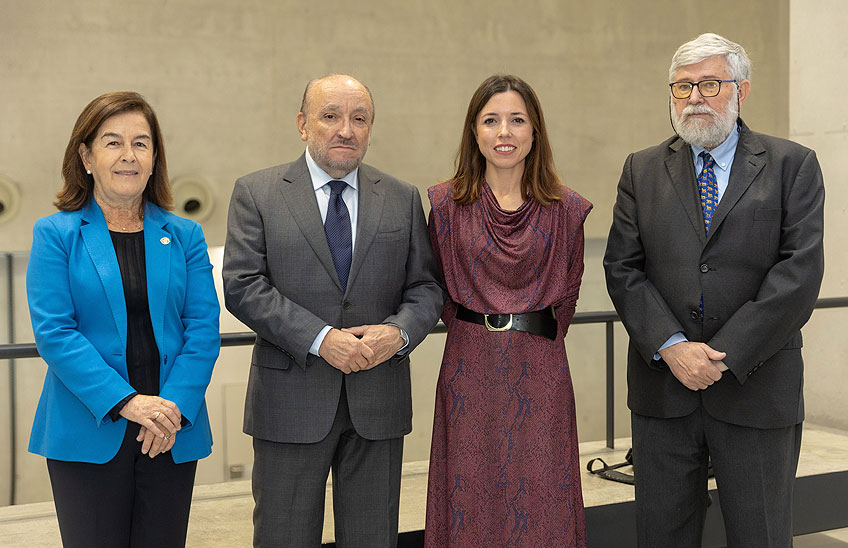María Jiménez, vice-dean: "In the face of terror, our response as School of Communication is and will be to do what we know and what we teach: to tell the story".
The University has inaugurated today the III workshop Contar el Terror, which addresses terrorism and how it has been told from journalism, fiction and non-fiction.

PhotoManuelCastells/From left to right, Isabel Moya, director General Manager of the Victims of Terrorism Foundation, Juan Benito Valenciano, president of the same foundation, María Jiménez, vice-dean of the School of Communication and Florencio Domínguez, president of the Victims of Terrorism Memorial Center Foundation, organizers of the III conference Contar el Terror at the University of Navarra.
17 | 10 | 2024
"In the face of terror, many responses are necessary, which are the responsibility of as many institutions. All of them seek, or we seek, with more or less success, to live up to this responsibility. Our response as School of Communication at the University of Navarra is and will be to do what we know and what we teach: to tell the story." The vice-dean of the School of Communication, María Jiménez, inaugurated with these words the 'III conference Contar el Terror: Las historias detrás de la historia' (III Telling Terror: The stories behind the story). The event is organized by the School of Communication, the Memorial Center for Victims of Terrorism and the Victims of Terrorism Foundation, with the support of the Government of Navarra.
The inauguration of the event was attended by the Minister of the Interior, Fernando Grande-Marlaska, the Councilor Ana Ollo, second vice-president of the Government of Navarra and Councilor of report and Coexistence, and Alicia Echeverría, government delegate in Navarra, among other authorities.
Grande-Marlaska urged the students of School of Communication, future journalists, to exercise their profession with responsibility and rigor. He then referred to the code of ethics of journalism and quoted:"In the defense of democratic values no one should be neutral". Marlaska stated that the horror of the attacks, the responsibility of those who commit them, the consequences of violence must be brought to light in order to avoid the risk of "romanticizing violence". "The activity of the terrorists must be goal of a rigorous informative treatment, far from sensationalism or speculation," he concluded.
The series addresses terrorism and how it has been told through journalism, fiction and non-fiction. This year the focus is on how to tell stories of attacks and victims, heroes or perpetrators who have often remained outside the narrative of terrorism and yet are core topic to understand the fine print of the terrorist phenomenon, its origin and consequences.
"The creators who are going to participate in this workshop have faced the challenge of telling the story of terrorism. Perhaps some of the students who are here today will also face the same challenge in not too long. It will not be an easy task. There are complex scenarios that transcend the moment of the attack or the acronyms of those responsible for the violence," continued María Jiménez.
The vice-dean of the School of Communication spoke of the freedom to commit oneself to what one believes in, the desire to understand and the search for truth, as values that were embodied yesterday by those who are victims of terrorism today. "From these classrooms we aspire for students to tell good stories and that sometimes implies, as Gregorio Ordóñez or David Beriain showed, or Marc Marginedas, kidnapped by the Islamic State, to commit oneself. It implies putting oneself at the service not of those who make the story, but of those who suffer it. And it also implies not remaining on the sidelines," he said.
Research on terrorism
Over the last few years, these meetings have served to investigate and transmit to society the need to reflect on terrorism. Victims' associations, reporters, public institutions and experts have participated.
In this edition, among the guests will be the journalist Manuel Calderón and Gaizka Fernández Soldevilla, historian, manager of research of the Victims of Terrorism Memorial Center, who will participate in the roundtable "Pulling the thread: how to investigate the violent past". The content director of the podcast production company TrueStory, Eva Lamarca, or the fiction creators Alberto and Jorge Sánchez-Cabezudo, directors of the series "See you in another life", about the 11M attacks.
Luisa Etxenike, award Euskadi de Literatura and author, among other publications, of the book "El ángulo ciego" about the victims of terrorism, who gave the inaugural session, also stressed: "When we talk about terrorism, we are going to talk about suffering, violence, death and how do we present suffering, death, violence? In the world in which we live, it is a very delicate point of view. We have to show it in a more discreet, respectful way, if we don't turn violence into a spectacle".
In the auditorium of the Museum of the University of Navarra, the students will be able to watch the film "La infiltrada", the true story of the police who dismantled an ETA commando. Afterwards there will be a colloquium with the director of the film, Arantxa Echevarría; María Luisa Gutiérrez, producer at Bowfinger International Pictures and Pablo Muñoz, journalist specialized in information on terrorism and advisor of the film.
The III conference Contar el Terror will end with the testimony of Alejandro Benito, whose brother was a victim of the 11M attacks, of which 2024 marked the twentieth anniversary.




